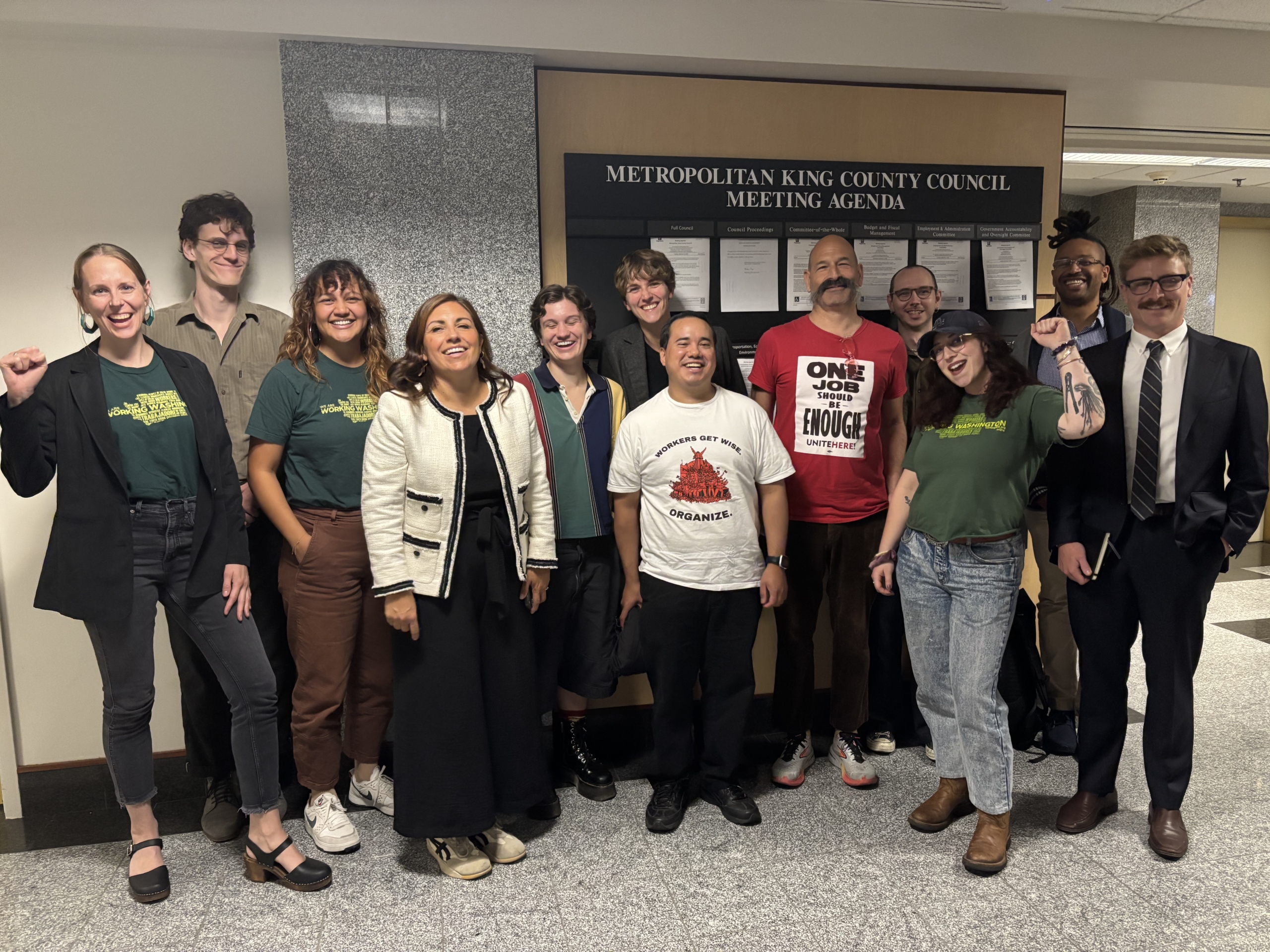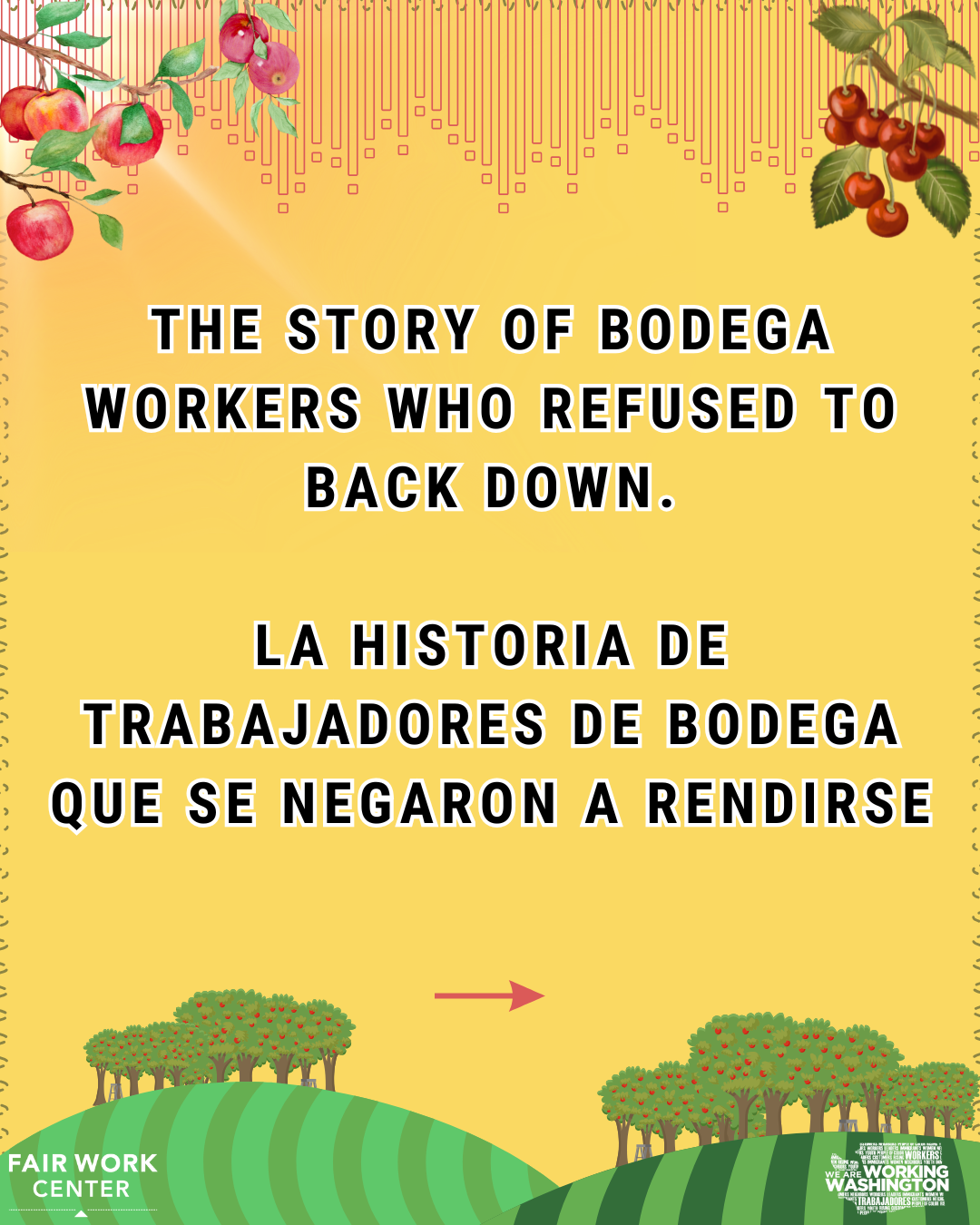(Español abajo)
Imagine toiling outdoors under the scorching sun to put food on the table and, despite your hard work, being attacked by the boss for who you are. Then imagine organizing with your coworkers to make a plan to fight back, and not only win a six-figure settlement but also use your power to make sure that the company makes meaningful changes to prevent any other worker at the company from being mistreated so terribly! That’s organizing.
In the summer of 2022, a group of 7 apple orchard workers at Borton, one of the mega farms in Yakima, began sharing experiences with each other and realized that a crew leader was mistreating each one. The boss demeaned some workers for being women, for having darker complexions, for appearing to have indigenous ancestry, and based on religion. Older workers, who brought years of experience to the orchard and were trying to do their job well, were berated for working too slowly for the boss’ liking. Anyone who dared to raise a complaint was punished for it. It’s a textbook case of abuse wrapped in a very thin disguise of “management.”
The whole system that some bosses rely on to make money is built around keeping workers divided. It’s not a glitch in the system or an oversight, it’s their strategy. They like pitting men against women, younger workers against older, white workers against people of color, workers with experience over new workers…you’re catching on, there are a lot of ways they like to do it! Why? They know that divided workers have a harder time organizing together to demand what we deserve!
Unfair bosses depend on division, fear, and a culture where workers keep our heads down because that allows the supervisor, the owner, and the corporations (all of them bosses) to squeeze every last profit from our hard work. Sometimes a company will do it as an order from the top, sometimes it will do it by intentionally turning a blind eye while an underling, like a crew leader, abuses their position. Either way, the boss does it on purpose to keep workers from coming together, speaking up, and demanding fair treatment and fair pay.
When the orchard workers at Borton started talking with each other, they had a realization: there are more workers than the boss and that means that together we have more power. Then a plan was organized through the Fair Work Center and the workers decided that the next step was to file legal charges against Borton through the Equal Employment Opportunity Commission (EEOC), a government agency that helps workers protect ourselves from unfair treatment and discrimination at work. It can be an important legal tool to fight for what we deserve. The EEOC offered a chance to use mediation to resolve the charges and the orchard workers insisted that they would not be divided and only agreed to go through the process together as a group.
At the mediation the company made absurd excuses for discriminating against the very workers who made them money. When it was their turn, the workers spoke out about being mistreated by the company and about being retaliated against for trying to do something about it. Even as the company continued to disrespect the orchard workers with their arguments, the workers stayed strong. After the mediation the company agreed to settle the charges with the seven workers.
Borton offered to pay the workers a six-figure settlement, but the workers did not accept the offer until the company agreed to take meaningful steps to prevent any other worker at the company from being mistreated so terribly. It was a deliberate choice to do that and not treat settlement negotiations as just a way to resolve the group’s specific charges. It was a way to win real improvements for all the workers at the company. By organizing together and making a plan, the workers improved the conditions in the workplace and won $200,000 for their trouble.
As part of the workers’ demands, the company agreed to pay for separate training sessions about its obligation to not discriminate against any workers, one for its managers and for the workers. The workers also got the company to agree to:
Improve complaint procedures so that in the future workers are protected from retaliation.
Explicitly agree that workers can make complaints outside of the normal chain of command, which is especially important when a worker’s direct supervisors are mistreating them.
Give workers a stronger voice in the company’s health and safety decisions.
Improve workers’ access to the restrooms.
Ensure workers get uninterrupted breaks.
Ensure workers participate in company safety and health committee meetings.
Bosses may want to continue running the orchards (and all our workplaces) like their own little kingdoms but, when workers come together to organize, the boss can’t continue to pretend they get to call all the shots. It’s long past time that we stop keeping our heads down and letting the bosses make us feel small and vulnerable. Together, we have the power to make our workplaces better, to ensure that we get treated fairly, and fight for what we deserve.
(English above)
Imagina trabajar bajo el sol quemante para llevar comida a tu casa y, a pesar de todo tu esfuerzo, que el jefe te ataque por quién eres. Ahora imagina que te organizes con tus compañeros para hacer un plan para defenderte, y que no solo ganen una demanda millonaria, sino que usen su poder para asegurarse de que la empresa haga cambios reales para que ningún otro trabajador sufra ese trato tan injusto. Eso es organizarse.
En el verano de 2022, un grupo de 7 trabajadores en un huerto de manzanas en Borton, uno de los mega productores en Yakima, empezó a platicar y se dieron cuenta que un líder de equipo los estaba maltratando a todos. El jefe humillaba a algunas personas por ser mujeres, por tener piel más oscura, por parecer tener ascendencia indígena, y por su religión. A los trabajadores mayores, que tenían años de experiencia y se esforzaban por hacer bien su trabajo, los regañaban por hacerlo “muy lento” para el gusto del jefe. Quienes se atrevían a quejarse, eran castigados. Es un caso típico de abuso disfrazado de “administración”.
El sistema que usan algunos jefes para ganar dinero está hecho para dividir a los trabajadores. No es un error ni un accidente, es su estrategia. Les gusta enfrentar a hombres contra mujeres, a jóvenes contra mayores, a trabajadores blancos contra personas de color, a los que tienen experiencia contra los nuevos… seguro ya entiendes, hay muchas maneras. ¿Por qué? Porque saben que si los trabajadores estamos divididos, nos cuesta más organizarnos para exigir lo que merecemos.
Los jefes injustos se apoyan en la división, el miedo y en una cultura donde los trabajadores mantenemos la cabeza baja, porque así el supervisor, el dueño y las empresas (todos ellos jefes) pueden exprimir hasta la última gota de ganancia de nuestro trabajo. A veces la empresa lo hace por orden directa de arriba, otras veces simplemente hacen como que no ven cuando un jefe de equipo abusa de su poder. De cualquier forma, el jefe lo hace a propósito para que no nos juntemos, no hablemos y no exijamos un trato y un sueldo justos.
Cuando los trabajadores de Borton empezaron a platicar, se dieron cuenta de algo importante: hay más trabajadores que jefes, y eso significa que juntos tenemos más poder. Entonces, con ayuda del Fair Work Center, hicieron un plan y decidieron presentar cargos legales contra Borton ante la Comisión para la Igualdad de Oportunidades en el Empleo (EEOC), una agencia del gobierno que ayuda a protegernos contra el maltrato y la discriminación en el trabajo. Esta agencia puede ser una herramienta legal muy importante para luchar por lo que merecemos. La EEOC ofreció usar la mediación para resolver el caso, y los trabajadores dijeron que solo aceptarían ir juntos, sin dejar que los dividieran.
En la mediación, la empresa puso excusas ridículas para justificar que estaban discriminando a quienes les daban dinero. Cuando tocó su turno, los trabajadores hablaron fuerte sobre el maltrato que sufrieron y sobre cómo los castigaron por intentar defenderse. Aunque la empresa siguió faltándoles al respeto con sus argumentos, los trabajadores se mantuvieron firmes. Después de la mediación, la empresa aceptó llegar a un acuerdo con los siete trabajadores.
Borton ofreció pagarles un acuerdo de seis cifras, pero los trabajadores no lo aceptaron hasta que la empresa se comprometió a tomar medidas reales para que ningún otro trabajador sufra ese mal trato. Fue una decisión consciente no ver el acuerdo solo como resolver los cargos de ellos, sino como una manera de ganar mejoras para todos en la empresa. Gracias a organizarse y planear, los trabajadores mejoraron las condiciones y ganaron $200,000 por su esfuerzo.
Como parte de las exigencias, la empresa acordó pagar capacitaciones separadas sobre su obligación de no discriminar, una para los gerentes y otra para los trabajadores. También lograron que la empresa:
Mejorará los procedimientos para quejas, para que nadie sea castigado por denunciar.
Acordara explícitamente que los trabajadores pueden presentar quejas fuera de la cadena normal, algo vital cuando el maltrato viene de los jefes directos.
Diera a los trabajadores más voz en decisiones sobre salud y seguridad.
Mejorará el acceso a los baños.
Garantizará que los descansos sean sin interrupciones.
Asegurará la participación de los trabajadores en las reuniones del comité de salud y seguridad.
Los jefes quieren seguir manejando los huertos (y todos los trabajos) como si fueran sus pequeños reinos, pero cuando los trabajadores nos unimos, los jefes ya no pueden pretender que todo lo deciden ellos solos. Ya es hora de dejar de agachar la cabeza y que los jefes nos hagan sentir pequeños y vulnerables. Juntos tenemos el poder para mejorar nuestros lugares de trabajo, exigir trato justo y luchar por lo que nos merecemos.


